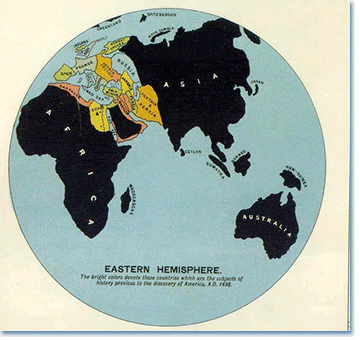Are historians still largely interested in their own nations, cultures, and societies, at the expense of the wider world? Data compiled by Luke Clossey and Nicholas Guyatt on almost 2,400 historians from nearly 60 history departments in the United States, United Kingdom, and Canada suggest that may be the case. Despite continued calls for broader interpretations and attention to neglected regions, they claim, historians in these countries remain focused on “the West,” and especially areas of the West where they live.
 In May 2013, Perspectives on History published Clossey and Guyatt’s summary of their research. We then asked several prominent historians, based in the US, UK, and Canada, to comment on the findings. The result is a wide-ranging discussion, now available online, that offers praise and critique, questions and solutions. Participants in this forum approached the findings from the perspectives of teachers, researchers, and administrators. The discussion includes suggestions for the classroom, historians’ interpretive frameworks, and the hiring decisions of history departments.
In May 2013, Perspectives on History published Clossey and Guyatt’s summary of their research. We then asked several prominent historians, based in the US, UK, and Canada, to comment on the findings. The result is a wide-ranging discussion, now available online, that offers praise and critique, questions and solutions. Participants in this forum approached the findings from the perspectives of teachers, researchers, and administrators. The discussion includes suggestions for the classroom, historians’ interpretive frameworks, and the hiring decisions of history departments.
We are making this forum—another installment in the Summer 2013 online-only edition of Perspectives on History— freely available. We hope readers will add their own comments to the discussion on this blog post, or at AHA Communities.
The Article
“It’s a Small World After All: The Wider World in Historians’ Peripheral Vision” by Luke Clossey and Nicholas Guyatt
Responses to the Article
“While even the most casual observer has long known that the study of North America and Europe—probably mostly Western Europe—is over-represented (relative to population) in our history departments, some of Clossey and Guyatt’s figures are quite striking.” Read more…
—Kenneth Pomeranz, Univ. of Chicago
“Historians certainly find stimulation in wide reading and intimate field circles. What we gain by a hearty mix of specialists without a dominant core is the habit of outward vision that results from everyday departmental encounter—from sharing manuscripts and students to crossing the hall for ideas and books.” Read more…
—Mary Elizabeth Berry, Univ. of California, Berkeley
“‘We’ now inhabit multicultural cosmopolitan worlds within which national boundaries have lost a great deal of their organizing agency and legitimacy. The problem is perhaps less that we ‘study ourselves’ and more that we limit our study far too much to the outdated histories of imagined unified national units that no longer exist and maybe never existed.” Read more…
—Anne Gerritsen, Univ. of Warwick
“The enfeebling condition of self-appointed exceptionalism, of self-containment, comes on for anyone, and comes on stealthily. Greater attention to wider-world histories will help, but it will not necessarily create more satisfying history.” Read more…
—Kenneth Mills, Univ. of Toronto
“Clearly, we must change the curriculum and create fields of research and teaching that expand our students’ horizons. We must also train our graduate students to teach in ways that aim for a global understanding of our past. Having taught world history for the first time in fall 2010, I can never teach my ‘European’ courses in the same way.” Read more…
—Teofilo F. Ruiz, Univ. of California, Los Angeles
“The case for wider-world history should not overstate the parochialism of ‘traditional’ fields. At the same time, a modest rebalancing between ‘traditional’ and underrepresented research regions would not damage the gains made in diversifying American, Canadian, or British history.” Read more…
—Luke Clossey and Nicholas Guyatt, in response to the forum
This post first appeared on AHA Today.



